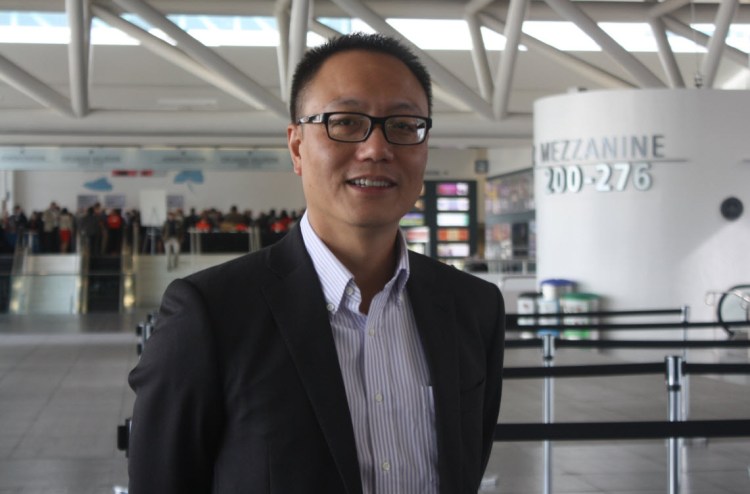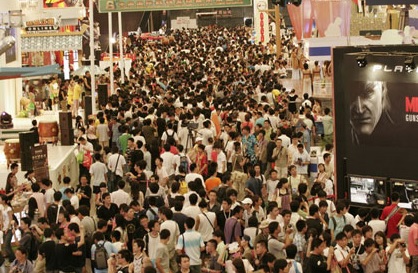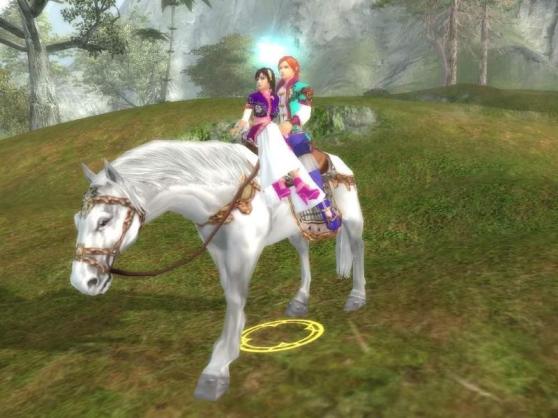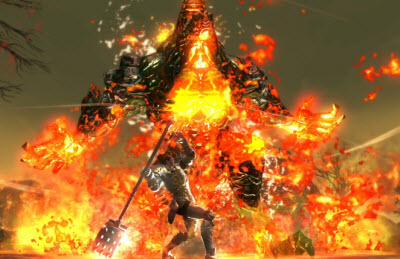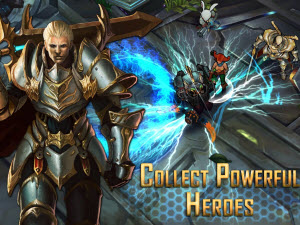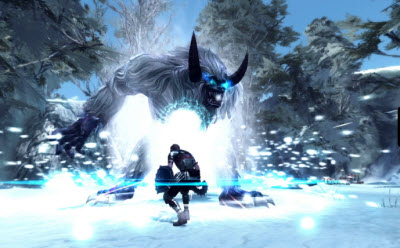After a decades-old ban, Microsoft and BesTV plan to launch the Xbox One video game console in China this September, adding a possible 500 million potential customers for the console industry. To take advantage of that opportunity, Chinese game publisher Perfect World has at least three games in the works for the console’s launch.
That aggressive development schedule is part of the plan by Robert Xiao, the chief executive of Perfect World, to become a global game publisher. Perfect World has more than 4,700 employees, including more than 2,000 in research and development, making it larger than Zynga. But the company isn’t well known in the West or outside of China. The 15-year-old publicly traded publisher has made a lot of money with online games in China, but it is barely scratching the surface in the U.S. market.
To change that, Xiao is launching the console games, and his company has invested in 20 game companies, including acquiring Cryptic Studios, maker of Star Trek Online, in the U.S. Among Perfect World’s games are the Dungeons & Dragons MMO Neverwinter, Torchlight II, and Blacklight Retribution. Xiao plans to expand that, and his ambitions are the reason why we’ve chosen Total World Domination as the theme of our GamesBeat 2014 on Sept. 15-16.
Here’s an edited transcript of our interview.
GamesBeat: In October, you were talking with me about going into mobile games. Can you bring me up to date on what’s happened since then?
Robert Xiao: Back then, we had only three or four games launched in China, including one hit game, Return of the Condor Heroes. That game has performed very well, and not only in China. We launched it in Taiwan and Korea. Both are doing very well. The game has been going steady up until now. It’s on the hardcore side for mobile. We expect that it’ll have a longer life cycle than most casual games.
Aside from that, we have 10 to 20 different games in our development pipeline to be released in the next 12 months. The mobile strategy is, we’re starting with more hardcore games. We’re moving fast on that. We’re seeing people spending more time playing hardcore games on mobile, at least in China. We believe we’re capturing that slice of the pie.
GamesBeat: You’re one of the potential keynote speakers at ChinaJoy, the big game tradeshow in Shanghai. I wonder what larger topics you’d like to address in front of an audience like that. Could you describe what that event is like for a Westerner, someone who isn’t familiar with it?
Xiao: I don’t know if I want to say anything too serious, but China Joy, on first impression—It’s a very crowded, noisy, Mardi Gras type of event. There are game companies and game journalists and game consumers from every corner of the world come to celebrate the culture of gaming. This year, I’m not sure, but it seems like it’s getting hotter and hotter, especially with the topics of both mobile and console coming up. Microsoft and Sony are both setting up stages at China Joy. They’re putting big dollars into promoting their platforms.
From my side, I don’t know what I would talk about yet, but eventually I’ll share some of my views from traveling around the world, talking to different people, and looking at different markets. I want to offer a global perspective. Being a purely Chinese developer and publisher is the past for us.
I just came back from Russia. I stayed for only two days, but I met a lot of people and talked about games in Russia as well. It was very interesting. It’s a growing market. Global players like us have a chance in emerging markets like that.
GamesBeat: What is the larger state of the mobile game industry in China? I was talking to an executive who is going to ChinaJoy. They were saying they’ll have a whole mobile pavilion there, a hall dedicated to mobile games.
Xiao: Mobile is definitely becoming very big. It’s explosive. People are coming from all directions toward mobile platforms. For us, it’s simple. We’ll use our abilities for building hardcore RPG-type games to start, but we’re not going to stop with replicating the games we’ve done on PC. We’re exploring different areas, more casual games. At the same time, we’re looking for new kinds of gameplay on mobile.
Other than the product side, we’re building our capabilities in distribution. We’re setting up our own channel in China. We have enough consumers on our platform that we can analyze, based on their data, to understand the consumer better and try to build mobile products according to their needs.
GamesBeat: Can you describe your emphasis in more detail? Is it iOS or Android? Is it all free-to-play? Are you aiming for longer game sessions? Is the cultural content primarily focused on China?
Xiao: Our most recent hit, Dawn of the Immortals, is based on the same IP as our PC game Battle of the Immortals. It’s a more western type of RPG. It’s true 3D. It’s probably the best-looking 3D game on mobile now. It’s very hardcore. The initial response from consumers has been good. It’s been released for a week and a half now in China, and it’s done well.
In terms of type, we’re not limiting ourselves to only Chinese types of games. In China, we do try to utilize a lot of specifically Chinese fantasy and historical-driven games, but at the same time we’re exploring different kinds of graphical expression, especially using more western types of characters. We’re trying to create a more global sense around our products. We’re aiming to create products that aren’t only limited to China. We want to export them to every corner of the world.
RPGs are very important. That’s our focus point for now. But eventually, as I said, we don’t want to limit ourselves to RPG. We’re also limiting ourselves to the typical free-to-play model. We invested recently in some smaller studios that are producing single-player games for mobile. They’ve been doing well as far as producing smaller-scale, shorter-cycle games on a pay-per-download model. We’re exploring every corner as far as the production side of mobile.
GamesBeat: Can you describe Perfect world for a Western audience in more general terms? I think you had 4,500 people last time we talked. Where are you now?
Xiao: We’re about the same, maybe 4,700 or so. I can’t release exactly how many are dedicated to mobile. But we have more than 2,000 people dedicated to R&D, to product development in general. An increasing number of those people are working on mobile.
We structure ourselves into studios. We don’t have studios specifically dedicated to mobile games, though. We have studios working on titles. Many of them are using a given IP to create PC games and mobile games at the same time.
GamesBeat: If you think of Western developers, I wonder how large you are compared to some others.
Xiao: We’re definitely smaller than they are. We’re smaller than EA. Those 2,000 development personnel include six or seven internal development studios, as well as more than 20 studios we’ve made investments in. A studio focuses on titles — for example, one might be working on Battle of the Immortals. Their first product was for the PC. The same group of people, though, may then work on similar games, using the same IP, for mobile. Or they’ll choose to develop something browser-based, or they might want to do a set-top box game.
That makes hard for us to identify exactly how many people might be dedicated to mobile games. But I’d say 80 percent of my studios are developing cross-platform games. They have some PC games in their portfolio, but they have been or are developing mobile games as well.
GamesBeat: What would you say are Perfect World’s larger ambitions as far as the global gaming market?
Xiao: Number one, we want to reach out and acquire as many gamers on our platform as possible. We want to get them playing our games. Number two, we want to see that our games have more alternative ways of entertaining people. From a content perspective, we want to have more kinds of characters and culturally oriented content. We don’t want to focus on Chinese culture. We want to draw elements from cultures all around the world.
We want to learn more about our consumers and understand their behavior. Obviously we have a considerable database in China. We have some data about the U.S. We understand Taiwan and Korea a bit. Across all these markets, consumer behavior is completely different. Even with one product, we want to customize it for different areas, so we can find deeper penetration and offer the best product to consumers no matter where we go. We want to get more people playing our games.
GamesBeat: I remember getting interesting statistics from some game analysts. One was saying that there were about 30 companies in Asia with a billion dollars in cash and a history of game companies. In the last couple of years, nine of the top 10 acquisitions on a worldwide basis in the game industry have been by Asian companies. It seems like Perfect World has some ambitions that follow those trends.
Xiao: You’re right. We’re using our cash to invest in studios around the world — not only in Asia. We have a PWIN project. It’s been investing in 20-some studios around the world, and the program is still rolling. Our focus now is very simple. We’re looking at mobile studios or console studios. We believe that not only mobile, but also console will be the next wave as far as bigger new markets in China.
GamesBeat: The Xbox One and possibly the PlayStation 4 are going to be launching in China. That’s a big opportunity for you?
Xiao: Yes, exactly.
GamesBeat: How much of an expectation can you have for that right now? Does that seem to be on a concrete schedule at this point?
Xiao: The console side of the story is different from either PC or mobile. Console is more reliant on hardware as the driver, especially at the beginning of the market. PC is vastly available. Everyone has a PC. Mobile, we’re growing to point where almost everyone has some kind of mobile device. Console will take some time. I don’t know exact dates, but it seems like the Xbox One is on schedule for this fall. The hardware will take its time to become popular among gamers, as early movers start to build games for Chinese audiences, but we believe that in the next year or two, it’ll move into a pretty explosive growth phase.
We acquired a Chinese online portal dedicated to console and TV-based gaming. There are tens of millions of users there who are somehow interested in console gaming experiences, or who already have consoles in China. Starting from there, I believe the audience can grow by several times.
GamesBeat: At this point, do you already have a lot of console titles in the works? Or are you still in a conception stage?
Xiao: We have some studios working on projects already, building specifically for Xbox One. Not only Chinese studios, but also studios we’ve acquired in the west. We have at least three studios working on console at this time. By the time Xbox One launches in China, we hope to be among the titles initially offered on the platform. We’ve been working for a while. We didn’t ask all of our studios to start developing console-based games, but we have two or three working already. After the launch, once we see the initial reaction, then we’ll decide on fuller investment in the consoles.
GamesBeat: The Chinese domestic market, I think, is on schedule to become the largest market in the world very soon. Maybe not this year, but maybe next year. I wonder how you think that’s going to change the global game market.
Xiao: It’ll be an interesting trend. More Chinese developers and publishers are moving to the world stage. More Chinese types of games — not just stories and characters, but business models as well — can be influential. Chinese gamers have completely different behavior compared to U.S. players. But as the Chinese market gets bigger and stronger, more Chinese types of games will be introduced to the world. Different player behaviors will gradually fuse together, I think. There won’t be such a clear line of separation around different parts of the world.
That’s the bigger trend. China will make different kinds of games available to the world, with different kinds of fun. People will have more choices in their entertainment.
GamesBeat: I was wondering how you view the different mobile messaging networks — things like WeChat — and whether that might be the right way to move into mobile game platforms. Are those slowing down, or are they maybe not the right way to do mobile games?
Xiao: That’s an effective way of spreading out, of distribution. But different mobile networks represent different kinds of users. Using social networks to distribute games, most of the games you see there are more casual. It’s an important channel, but eventually social networks run up against their limitations. Social networks are still spreading quickly. They haven’t saturated yet. But they’re for different types of mobile games.
We’re talking about mobile games in general, not just one type. User bases are growing at a rate to where there are many different types playing games on the mobile platform, and different distribution channels will have advantages for different types of mobile games. For one of our recent releases, the game is a 300MB download. It’s huge. The way we’ll distribute this game is different from the distribution of a five-megabyte casual game.
We’re starting from more hardcore RPG types of games with bigger download sizes. Then we’ll move into a wider spread of different types of games. So far we haven’t been using social networks as a channel for our games.
GamesBeat: Do you expect much near-term impact from cloud gaming?
Xiao: That’s very hard to say. The significance of cloud gaming relies on bigger games, the kind you don’t want to have to download. In my mind, I’m seeing bigger console games, TV-focused games, where you don’t want to bother downloading it. You just want to switch it on and play. For smaller games, why use the cloud? So far, I don’t see so many realistic applications for it at this point in time.
We might be seeing some things coming up on the technology side in the next six to 12 months. We’re looking at that. But so far, our strategy is to wait and see.
GamesBeat: The core online game business, I think you had a bit of margin slipping in the last quarter. Is anything happening there that’s worth noting, or do you think you still have a strong core online game business?
Xiao: On the PC side, right? Overall, the proportion there is declining slightly. We see that as normal. We haven’t had any major new titles launching in the past six months. On the PC side, our growth is driven by new games. Whenever you have new titles, new content, different kinds of gameplay, better graphics, you see big growth. This year, the bigger part of our growth is coming from the mobile side. The PC is slightly declining, or coming up to stabilize a bit in the next quarter. PC growth will be coming from our next big titles.
VentureBeat's mission is to be a digital town square for technical decision-makers to gain knowledge about transformative enterprise technology and transact. Learn More
